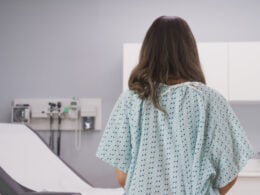Like many women I know, I was put on hormonal birth control at a young age to manage menstrual pain. Desperate and confused, I complied with what medical professionals prescribed. What followed were years of struggle and unwanted side effects. When I finally received my endometriosis diagnosis and real treatment for this disorder, my entire world changed.
During those years of pain and struggle, I was completely miserable. I felt betrayed by my body and misled by my doctor. I wanted answers and healing, not a simple band-aid. Why did I have excruciating pain? Why was I so darn tired all the time?
As it turns out, the answer to these questions was a common condition called endometriosis. Endometriosis is a diseased state where tissue similar to the inner lining of the uterus, known as the endometrium, grows outside of the uterus. Women with endometriosis experience intense cramping, pain around ovulation, difficulty getting pregnant, and chronic fatigue.
Endometriosis: Fairly common, but poorly understood
Endometriosis is a mysterious disease and its etiology is not well understood. We know that endometriosis is a chronic inflammatory disease, and that it behaves similarly to cancer. Yet, it’s different from cancer in that it’s generally non-life-threatening.
We also know that endometriosis is a fairly common disease. It is estimated that it affects one out of every ten women of reproductive age. Endometriosis also comes with a high incidence of comorbidity. The risks for inflammatory and autoimmune diseases such as Crohn’s disease, Lupus, Interstitial Cystitis, and Irritable Bowel Syndrome are significantly higher in women with endometriosis. Endometriosis is undoubtedly a challenging condition to manage, but early diagnosis and a multidisciplinary medical team often results in better disease management and better health outcomes.
Unfortunately, on average, an accurate diagnosis of endometriosis is made ten years after symptoms first appear. Women cannot easily be tested for endometriosis through blood, urine, or saliva tests. Furthermore, pelvic examinations and ultrasounds are often not adequate enough to make a definitive diagnosis. Instead, most women who visit their gynecologists and complain of severe cramps are never provided a thorough medical evaluation to determine the underlying causes of their menstrual pain. They are routinely prescribed some form of hormonal birth control (HBC), and sent on their way.
The most common endometriosis “treatments” aren’t actually FDA approved to treat endo
Hormonal birth control is a class of potent prescription drugs approved by the FDA to suppress ovulation and prevent pregnancy. Popular applications of HBC include “the pill,” intrauterine devices (IUD), the Depo-Provera shot, and transdermal patches, which work by releasing the synthetic versions of hormones estrogen (estradiol) and progesterone (progestin) into the body to shut down the female reproductive system. Ovulation is suppressed, and there is a thinning effect on the lining of the uterus (the endometrium), that can help alleviate menstrual pain associated with endometriosis.
With the exception of the Depo-Provera shot, hormonal birth control is not actually FDA approved for treatment of endometriosis, and for good reason. While HBC may address the symptom of endometriosis pain, it does little to get to the root cause of the pain. In other words, HBC functions more as a temporary painkiller, rather than treating the underlying issue or disease. Still, off-label use of HBC is incredibly common to “treat” endometriosis—in fact, 58% of women are prescribed HBC for reasons (like endometriosis) other than pregnancy prevention.
While hormonal birth control may offer symptom reduction for some women with endometriosis, it comes with a myriad of risks and side effects. Use of HBC has been shown to deplete key nutrients, increasing a woman’s risk for arterial and venous thrombosis, pregnancy complications, birth defects, cancer, and cardiovascular disease. There is also scientific evidence that HBC use is associated with an increased risk of autoimmune diseases, including Crohn’s disease, Lupus, and Interstitial Cystitis. Depo Provera is linked to osteoporosis in young women and increased risk of HIV transmission from men to women. All of this evidence suggests that hormonal birth control may exacerbate conditions to which women suffering from endometriosis are already predisposed.
Despite all of these risks and side effects—and despite not actually having FDA approval for endometriosis treatment—HBC remains the first line of treatment for most women presenting with the key symptoms of endometriosis. But is the use of hormonal birth control truly the best approach medicine has to offer for managing endometriosis?
A better way to get an endometriosis diagnosis and find real treatment
Authentic diagnosis and treatment of endometriosis requires an investigative, multifactorial approach. The gold standard for definitive diagnosis of endometriosis is through laparoscopic surgery, and laparoscopic excision surgery is the gold standard for treatment. Finding a surgeon who specializes in the diagnosis and treatment of endometriosis is key, however, as not all surgeries are created equal.
A common yet inadequate surgical technique for treating endometriosis is ablation and cauterization, which burns off and destroys endometrial lesions. This approach only removes tissue on the surface and ignores the diseased tissue growing beneath the surface. An endometrial lesion is like an iceberg—most of the disease lies implanted underneath the surface tissue. We often hear stories of women undergoing ablation surgery only to have it grow back a few years later. Laparoscopic excision surgery removes the diseased endometrial tissue at its root, without harming the surrounding, healthy tissue.
Women deserve better than a “quick fix”
With all of the difficulty in diagnosing and treating endometriosis, it’s perhaps easy to understand why a band-aid approach like hormonal birth control is so often used as the first line of treatment for women suspected to have endometriosis. But the truth is, HBC is an easy, yet temporary fix that comes at a big price. Pop a pill and the symptoms may diminish within a few cycles, which provides welcome relief for women experiencing debilitating pain. But what about the side effects like mood changes, depression, decreased libido, and an increased risk of breast and cervical cancer? Not to mention triggering autoimmune disease in an already at-risk population. Many women are simply masking one ill while risking others.
In addition to the health risks above, hormonal birth control has been shown to have adverse effects on overall fertility. Dr. Phil Boyle, founder and director of the Neo Fertility Clinic in Dublin, Ireland, expressed his concern with prescribing HBC for endometriosis stating “It does nothing to get to the root cause of the disease. Implanted endometrial tissue remains and the fertility cycle—part of a finely balanced endocrine system is switched off and this has the potential to adversely affect a woman’s future to have children. We don’t have evidence to prove we’re protecting a woman’s fertility by prescribing HBC or doing anything to reduce or prevent future spread of the disease.” Sadly, based on his clinical experience, women with untreated endometriosis miscarry up to 50% of the time.
So, what’s a woman with endometriosis to do?
Your game plan for assembling an endometriosis diagnosis and treatment team
It takes a multi-disciplinary approach and a skilled team to get a long-lasting solution for endometriosis. Jessica Drummond, Ph.D., is the author of Outsmart Endo. Dr. Drummond equates endometriosis treatment to a team sport. So, who do you need on your Endo team?
The Endometriosis Team Line-up:
1. Integrative Health Coach well-versed in Cycle Charting
This is a rare breed of health coach who specializes in helping women map their cycles. With their help, your charts can become a diagnostic tool to optimize reproductive symptom investigation and improve treatment outcomes. In addition to charting your cycle, this health coach can help you to focus on lifestyle factors that exacerbate endometriosis and create a customized plan to cultivate an anti-inflammatory lifestyle that promotes healing.
2. RRM Physician (Restorative Reproductive Medicine)
Restorative reproductive medicine is an emerging field that focuses on root-cause, solution-based approaches to reproductive health issues. Restorative reproductive medicine doctors recognize HBC as woefully inadequate at treating endometriosis.
When looking for a physician, ask if they prescribe Low-Dose Naltrexone (LDN). Like the Pill, this is an off-label use of a medication, but the benefits far outweigh HBC. According to Dr. Boyle, in clinical practice LDN dramatically improves PMS, fatigue, and negative symptoms associated with endometriosis. LDN can aid in the restoration of fertility, and in practice it is completely safe during pregnancy and reduces the risk of miscarriage.
3. Pelvic Health Physical Therapy
Pelvic health physical therapy addresses the common myofascial and musculoskeletal pain associated with endometriosis. It also addresses the post-operative scar management of endometriosis and endometriosis excision surgery. (Pelvic health physical therapy can also help with painful sex.)
4. A Skilled Endometriosis Excision Surgeon
As stated before, the gold standard treatment of endometriosis is deep excision surgery by a surgeon who specializes in endometriosis. With this approach, the surgeon removes the lesions in their entirety. Dr. Paul Yong, research director and gynecologist specializing in excision surgery at the British Columbia Women’s Center for Pelvic Pain and Endometriosis explains, “You want a surgeon who will carefully examine all of the surfaces of the abdomen and has experience in recognizing atypical presentation of endometriosis, otherwise, the disease will be missed. It is also important the surgeon removes the diseased tissue no matter where it’s present. This takes a highly skilled surgeon and often an interdisciplinary team.”
Quick fixes don’t work, but a true endometriosis diagnosis and commitment to real treatment can
The reality is: There is no “cure” for endometriosis. It’s a lifelong journey. As tempting as it is, hormonal birth control offers a suboptimal, quick fix, with a long and growing list of adverse side effects and risks. Women deserve better. You deserve better. By creating a web of support and a clear plan of action, you can outsmart endometriosis and pave a path to healing.
One way you can start is by finding an integrative health coach who is well-versed in cycle charting. She will help you build your team by tapping into a professional network to find the right physician, surgeon, and team players to help you live a life pain-free and full of energy.
If you’d like to learn more about endometriosis and how to treat this condition without birth control, check out our other endo resources, below:
To find a restorative reproductive medicine doctor or healthcare professional who can treat you via telehealth, click here.
“What causes endometriosis?” and other questions about endometriosis: A Natural Womanhood Endo FAQ
How I got help with endometriosis without the Pill
Spotting between your periods could be a sign of endometriosis











